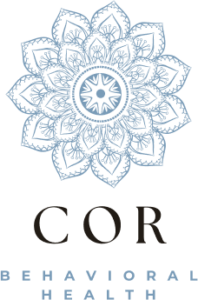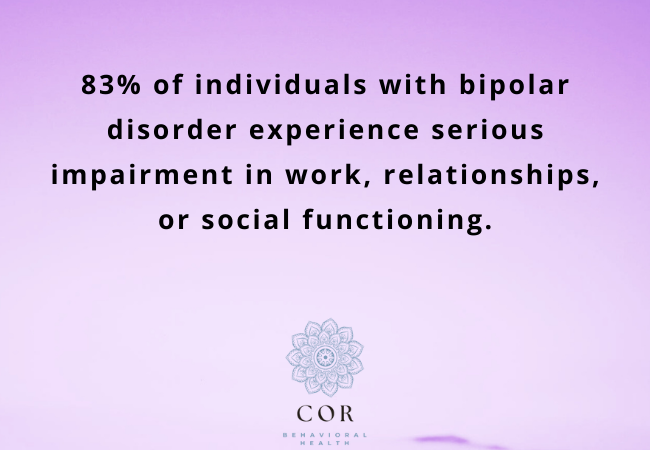
Bipolar disorder is a complex and chronic mental health condition, but with the right treatment and support, it is manageable—and recovery is absolutely possible. While there’s no one-size-fits-all solution, the combination of therapy, medication, and ongoing support remains the cornerstone of long-term stability and wellness.
At COR Behavioral Health, we offer integrated and individualized bipolar treatment in Martin County, Florida that blends these three pillars to help clients restore balance, rebuild relationships, and regain control of their lives.
In this blog, we explore how each component—therapy, medication, and support systems—plays a crucial role in bipolar disorder recovery, and how they work together to foster hope, resilience, and lasting healing.
Understanding Bipolar Disorder
Bipolar disorder is marked by alternating periods of mania (or hypomania) and depression. These shifts can disrupt everything from decision-making and emotional control to work performance and relationships.
Core Symptoms of Bipolar Disorder:
- Manic or Hypomanic Episodes: Increased energy, elevated mood, decreased need for sleep, impulsive behavior, racing thoughts
- Depressive Episodes: Low mood, fatigue, hopelessness, difficulty concentrating, sleep and appetite changes, suicidal thoughts
There are different forms of the condition, including Bipolar I, Bipolar II, and Cyclothymic Disorder—all of which require comprehensive care.
Why a Combined Approach to Treatment Matters
Bipolar disorder affects many areas of life: emotional, cognitive, relational, and physical. That’s why the most effective treatment includes multiple approaches—each targeting a different layer of the condition.
At COR Behavioral Health, our Addiction and Mental Health Treatment Center in Martin County, Florida provides coordinated care to treat not only bipolar disorder, but also co-occurring conditions like depression, trauma, and anxiety.
1. Therapy: Rewiring Thought Patterns and Rebuilding Life Skills
Therapy is a cornerstone of recovery. While medication helps regulate the brain’s chemistry, therapy teaches you how to navigate daily life with greater awareness and stability.
Individual Therapy in Martin County, Florida
Our licensed clinicians provide one-on-one therapy using evidence-based modalities such as:
- Cognitive Behavioral Therapy (CBT): Helps clients identify distorted thoughts, challenge cognitive biases, and reframe emotional responses.
- Dialectical Behavior Therapy (DBT): Builds emotional regulation, distress tolerance, and mindfulness—especially useful during mood fluctuations.
- Psychoeducation: Empowers clients and families by teaching them how bipolar disorder works, how to recognize early warning signs, and how to develop self-management tools.
How Therapy Helps in Bipolar Recovery:
- Develops insight into mood patterns and triggers
- Improves problem-solving and decision-making
- Reduces risk of relapse through behavioral tools
- Strengthens communication and relationship skills
- Supports personal identity outside of the illness
2. Medication: Stabilizing Brain Chemistry and Preventing Relapse
Medication is often a necessary part of treatment for individuals with bipolar disorder. It helps regulate the chemical imbalances in the brain that lead to manic or depressive episodes.
Common Medications Include:
- Mood Stabilizers: Lithium, valproate, lamotrigine
- Antipsychotic Medications: Quetiapine, aripiprazole, olanzapine
- Antidepressants (with caution): Usually combined with mood stabilizers to avoid triggering mania
At COR Behavioral Health, our psychiatric team monitors each client’s response to medication, ensuring it’s safe, effective, and part of a larger personalized treatment plan.
Benefits of Medication in Recovery:
- Reduces symptom severity and frequency
- Helps regulate sleep, energy, and motivation
- Decreases risk of suicidal thoughts and hospitalization
- Supports engagement in therapy and daily routines
Clients in our Partial Hospitalization Program in Martin County, Florida and Intensive Outpatient Program in Martin County, Florida receive consistent medication management and follow-up.
3. Support Systems: Building Long-Term Resilience
Bipolar disorder is a lifelong condition. That’s why ongoing support from peers, family, and care providers is critical to long-term recovery.
Group Therapy in Martin County, Florida
Our structured groups provide a safe, supportive environment where clients can:
- Share experiences and challenges
- Learn new coping strategies
- Develop social support and accountability
- Normalize the recovery journey
Many clients say that being heard—and hearing others—is one of the most healing parts of treatment.
Family Support and Education
Family involvement, when appropriate, enhances recovery by creating understanding and reducing conflict at home. We provide:
- Family counseling sessions
- Educational resources on bipolar disorder
- Tools for better communication and boundaries
Community Support and Aftercare
After formal treatment ends, our team helps clients connect with aftercare, including:
- Peer support groups
- Alumni programs
- Relapse prevention planning
- Continued access to outpatient therapy
Recovery is not just clinical—it’s communal.
How Our Programs Support Recovery
COR Behavioral Health offers a full spectrum of care to meet each client’s needs at every stage of the recovery process.
Partial Hospitalization Program (PHP)
Ideal for individuals needing stabilization without inpatient admission, PHP includes:
- Daily therapy and medication management
- Skill-building and goal-setting
- Crisis prevention and emotional support
Intensive Outpatient Program (IOP)
A step-down or flexible option for those with milder symptoms, IOP includes:
- Group and individual therapy several days per week
- Focus on reintegration into work, school, or family life
- Ongoing psychiatric and wellness support
These structured levels of care allow for intensive focus on healing while maintaining personal responsibilities and independence.
Addressing Co-Occurring Conditions
At COR Behavioral Health, we know that bipolar disorder rarely exists in isolation. We offer integrated care for:
- Depression: Even during stable periods, lingering depressive symptoms can persist. Our depression treatment in Martin County, Florida addresses these underlying challenges.
- Anxiety: Panic, worry, and fear can trigger episodes. We provide targeted anxiety treatment in Martin County, Florida to help manage these symptoms.
- Trauma: Past trauma may influence mood swings and emotional regulation. Our trauma treatment in Martin County, Florida creates a safe space for healing.
- Addiction: Many individuals with bipolar disorder use substances to self-medicate. We specialize in dual diagnosis care through our Addiction and Mental Health Treatment Center in Martin County, Florida.
Why COR Behavioral Health?
- Expert clinicians specializing in mood disorders and co-occurring conditions
- Personalized treatment plans combining therapy, medication, and structured support
- Flexible programs like PHP and IOP tailored to your level of need
- Whole-person approach that includes family, peer, and community support
- Accessible care in the heart of Martin County, Florida
We don’t just manage symptoms—we help you build a life of balance, clarity, and confidence.
Conclusion
Bipolar disorder can feel overwhelming—but you are not alone, and you are not powerless. With a comprehensive treatment plan that includes therapy, medication, and a strong support system, recovery is not just possible—it’s sustainable.
At COR Behavioral Health, we’re here to walk alongside you every step of the way. Call us today at 888.231.7973 to learn more about our bipolar treatment in Martin County, Florida, and discover how we can help you take back your life—with stability, dignity, and hope.
Frequently Asked Questions (FAQs)
Why is therapy important in bipolar disorder recovery?
Therapy helps individuals understand mood patterns, manage symptoms, improve relationships, and develop healthy coping strategies. At COR, we offer individual therapy in Martin County, Florida using evidence-based approaches like CBT and DBT.
Do people with bipolar disorder always need medication?
In most cases, yes. Medication helps stabilize mood swings and prevent episodes. Our psychiatric team offers expert medication management as part of a personalized treatment plan.
How does group therapy help with bipolar disorder?
Group therapy in Martin County, Florida provides connection, support, and shared learning. It reduces isolation and reinforces skills taught in individual therapy.
What are PHP and IOP, and how do they help in bipolar recovery?
Our Partial Hospitalization Program (PHP) and Intensive Outpatient Program (IOP) offer structured, intensive treatment for individuals needing more support than traditional outpatient care.
Can COR Behavioral Health treat bipolar disorder with co-occurring conditions like anxiety or addiction?
Yes. As a full-spectrum Addiction and Mental Health Treatment Center in Martin County, Florida, we treat bipolar disorder alongside anxiety, depression, trauma, and substance use disorders with integrated, compassionate care.





